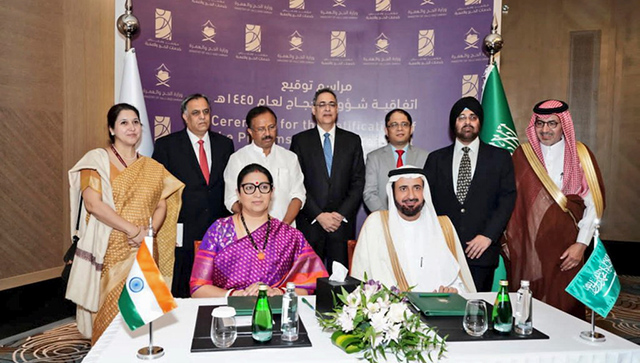This is a review of an Indian Islamic scholar’s speech on what sort of relationships Muslims should have with non-Muslims in the light of Quranic verses. The speech was published as an essay, titled, “The rights and relations with non-Muslim relatives” by an Islamic journal. Perhaps, the expression “non-Muslim relatives” is used because during early days of Islam, there were many Muslims whose family members hadn’t embraced Islam.
The speech was delivered by Mufti Mohammad Shakir of the Madrassa Islamia Arabia Baitul Uloom, situated at Sarai Meer in Azamgarh district of Uttar Pradesh, at a seminar on “The foundations of relations and cooperation between Muslims and non-Muslims in the light of the Quran”. The seminar was organised by Madrassatul Islah of Sarai Meer on 16-17 November, 2016. Madrassatul Islah is a leading madrassa where students from Tibet and Myanmar used to study till the 1950s.
The speech was published in five parts in Faizan-e-Ashraf, an Urdu-language monthly journal published by the Madrassa Islamia Arabia Baitul Uloom, starting from January 2017 through June 2017, except for the month of February.
The universalism of Islam
Mufti Shakir begins his essay by arguing that to make this world a heaven Islam teaches Muslims the lessons of humanity, brotherhood, unity, equality and moderation, service of humankind, and good manners of speech, and the like. “Only that society fits to be called Islamic society whose foundation is organised on the basis of mutual brotherhood and unity,” he notes. Shakir then observes: “Where the Quran announces: ‘Indeed, the religion in the sight of Allah is Islam’ (Verse 3:19), it also clarifies: ‘There shall be no compulsion in (acceptance of) the religion’ (Verse 2:256).”
Based on these two verses, Shakir concludes that force cannot be used to make non-Muslim accept Islam, and observes: “The pious Quran gives the same basic rights to Muslims as well as non-Muslims such as protection of life and property, safeguard of honour and dignity, peace of personal life, right to freedom of belief, protection of the places of worship, etc.” The issue Shakir, however, does not address is this: Islam gives all these rights to non-Muslims only if they live under the Sharia rule. In other words, non-Muslims can enjoy these rights and freedoms only as second-class citizens under an Islamic rule, a fundamental Quranic directive based on which Pakistan legally prohibits non-Muslim Pakistani citizens from becoming the head of the state.
There are additional problems with Shakir’s argument. He quotes the above two verses only partially. For example, the Verse 3:19 reads in full: “Indeed, the religion in the sight of Allah is Islam. And those who were given the scripture did not differ except after knowledge had come to them — out of jealous animosity between themselves. And whoever disbelieves (ie, non-Muslims) in the verses of Allah, then indeed, Allah is swift in (taking) account.”
Similarly, the full version of Verse 2:256 reads: “There shall be no compulsion in (acceptance of) the religion. The right course has become clear from the wrong. So, whoever disbelieves in Taghut (non-Muslim oppressor) and believes in Allah has grasped the most trustworthy handhold with no break in it. And Allah is hearing and knowing.”
“Polytheism and kufr (unbelief) are the biggest crimes in the eyes of Islam and its laws, but even those guilty of these are not deprived of human rights,” Shakir says, adding that Islam requires Muslims to be on good behaviour with their relatives but, unlike in other religions, in fulfilment of “the happiness of Allah”. He cites several Quranic verses and hadiths (traditions of Prophet Mohammad) that require Muslims to adopt an attitude of compassion towards their relatives. Citing Verse 60:8 , Mufti Shakir states emphatically that Islam doesn’t lay “the condition of being Muslim and non-Muslim” in order to help the poor or those in difficulties. Stating that the Quran is not a book for Muslims only, Shakir cites Verse 2:272 to criticise those Muslims who do not help non-Muslims due to their beliefs in idolatry and polytheism.
The problem of Islam
“The Quran declares all the national creeds and religions which become a cause of dividing humanity into pieces as accursed,” Shakir writes in a sentence which seems to uplift humanity to the highest level. However, the very next part of his sentence declares that the Quran “guides that the true religion of God is the one that is very near/affinitive to God. And affinity to God means that it rises above all factions and nations, encapsulating the entire humanity in its arms and such a religion… is only and only Islam”. This is where the problem begins.
After having discussed that Islam stipulates no condition of religion in having good behaviour and compassion with non-Muslims, Shakir begins to undo this argument. He cites how Hazrat Maymunah, the prophet’s wife, freed a female slave; to this, the prophet responded saying you could have got more blessings of God if you had given the slave to one of your maternal uncles. Shakir cites _hadith_s to argue that simply changing the method, one can get double blessings for a single act, and observes: “Along with all these rights, the ties of a love-by-heart with non-Muslim dear and near ones is not rightful.” In justification, he cites the Quranic verse 58:22 partly, which states: " You will not find a people who believe in Allah and the Last Day having affection for those who oppose Allah and His Messenger, even if they were their fathers or their sons or their brothers or their kindred…."
Further, Shakir quotes the Verse 60:1 partly as saying: “O you who have believed, do not take My enemies and your enemies as allies, extending to them affection while they have disbelieved in what came to you of the truth….”
Continuing with his argument that Muslims should not have good relationship with _kafir_s (non-Muslims), he quotes another Verse 3:28 : “Let not believers take disbelievers as allies rather than believers. And whoever (of you) does that has nothing with Allah….” He quotes the 14th century’s celebrated interpreter of the Quran, Ibn Kathir, as saying that in Verse 3:28, Allah has prevented Muslims “from loving kafirs” and “from sharing secrets”. He quotes the Verse 3:118 which prevents Muslims from sharing secrets with non-Muslims: “O you who have believed, do not take as intimates those other than yourselves, for they will not spare you (any) ruin. They wish you would have hardship….”
The Islamic scholar says: “It emerges obviously from these verses that to have business and friendship with _kafir_s is haram and strictly forbidden.” Shakir notes: “But nowadays, the attention of Muslims is not at all towards this (order of) prohibition; friendship with _kafir_s and discontent with our ones, worldly interest is in front of (of us); we have friendship with _kafir_s to preserve worldly interests, (but) do not care for friendship with Muslims….”
He adds: “The enemies of Islam get Muslims to write articles which comprise of the internal situations and matters of Muslims and their intentions and news of their institutions. These people are friends of _kafir_s. The friendship of Muslims and Islam is not before them.” He quotes the Verse 3:28 partly: “And whoever (of you) does that has nothing with Allah.”
The types of relationships
Shakir notes that there are three types of relationships with non-Muslims: religious, social and business. In religious matters, he observes: “there are two types of non-Muslim relatives — apostates and zindeeq such as Qadianis ; no type of relationship with them is right.” Qadiani is a pejorative term for Ahmadi Muslims. Zindeeq, however, has different meanings: it could mean freethinkers but in the popular understanding among South Asian Muslims, it is used for pigs which are considered unpious in Islam. Apostates are those who have left Islam. Shakir also quotes Verse 48:16 to support his argument that any type of relationship with such persons is not possible, presumably because they have left Islam.
Also, Shakir observes: “Among others, friendly relationship is not possible with non-Muslims of Jews and Christians” and citing the Verse 60:1 , he says — “in other words, it is not right for momineen (faithful Muslims) to befriend _kafir_s, but to have good conduct with them is not only good, but better.”
He notes that non-Muslims used to eat alongside Prophet Mohammad. Shakir’s observation makes it clear that ex-Muslims and Ahmadis are worse than non-Muslims in the imagination of Islamic clerics. In the same breath, Shakir quotes Prophet Mohammad as saying that it is not right to join in the religious rituals and celebrations of non-Muslims.
With regard to social relationships, the Islamic scholar observes that Islam wants Muslims to maintain social ties with non-Muslims and be compassionate and loving towards them. To support this argument, he quotes the Verse 5:2 partly: “And cooperate in righteousness and piety, but do not cooperate in sin and aggression. And fear Allah; indeed, Allah is severe in penalty.”
He also notes that the prophet attended meetings in the homes of non-Muslims, notably to reach peace agreements. With regard to economic and trade relationships, Shakir says that such relations are right provided that common Muslims are not hurt as a result.
Concerning what kind of relationships Muslims should have with non-Muslim parents who have not converted, as was the case during the early days of Islam, Shakir notes that one must serve parents, whether they are Muslim or non-Muslim. For justification, he quotes the Quranic Verse 46:15 partly: “And We have enjoined upon man, to his parents, good treatment.”
And then he adds a condition: “It is not at all right to have a relationship of love with non-Muslim parents and to obey them against the order of Allah.” He quotes the Verse 31:15 to argue that Allah forbids Muslims to obey parents if they share a God with them, notably if they force them to believe in polytheism.
However, Shakir’s key argument, citing many _hadith_s, remains that Muslims must not severe ties with non-Muslim parents. However, in social situations, he advises that after expressing words of greetings, one should move away from such parents. The Islamic scholars quotes many incidents from the life of Prophet Mohammad and many _fatwa_s (Islamic decrees) to argue that Muslims must help non-Muslims. However, he also cites the Verse 11:37 to argue a case that Muslims must not obey non-Muslims in their religious and collective life. As per the verse, Allah says: “And construct the ship under Our observation and Our inspiration and do not address Me concerning those who have wronged (Muslims); indeed, they are (to be) drowned.”
The concept of equality in Islam, as understood by Muslims, has always been “Islamic equality”, or equality between Muslims only. This excludes equality for non-Muslims. Shakir notes that non-Muslims “are not members of Islamic brotherhood” and cites the Verse 49:10 in justification: “The believers are but brothers, so make settlement between your brothers.”
Perhaps, this is one of the reasons why the Egyptian terrorist group calls itself Muslim Brotherhood, or Ikhwanul Muslimeen.
Among Muslims, it is a commonly held belief that Muslim men can marry women of Judaism and Christianity, or people of the book, without converting them to Islam. But, Shakir quotes the Verse 2:221 : “And do not marry polytheistic women until they believe (i.e. convert to Islam). And a believing (Muslim) slave woman is better than a polytheist, even though she might please you. And do not marry polytheistic men (to your women) until they believe. And a believing slave is better than a polytheist…” The reason Muslims are forbidden from marrying the men and women of infidels, he says, is because “kafir men and women become the cause of leading humans towards jahannam (hell)….”
With regard to the permission that Muslims can marry women of of the book, Shakir observes that many sahaba (companions of the prophet) such as Abdullah bin Umar were opposed to this practice because they did not see any difference between a polytheist and such a woman. He cites the case of Umar ibn Khattab, the second caliph of Islam, who agreed that Muslim men were permitted to marry women of the books but disliked this practice. Therefore, Umar ibn Khattab ordered a Muslim to divorce a Jewess. Shakir concludes his essay by arguing that good manners are essential to be observed by Muslims in society, insofar as they do not conflict with the tenets of Islam, and argues that exchanging gifts with non-Muslims for better relations and visiting their graveyards is the rightful things to do – especially because it can help in the preaching of Islam.
The author, a former BBC journalist, is a contributing editor at Firstpost and executive director of the Open Source Institute, New Delhi. He tweets @tufailelif


)




)
)
)
)
)
)
)
)